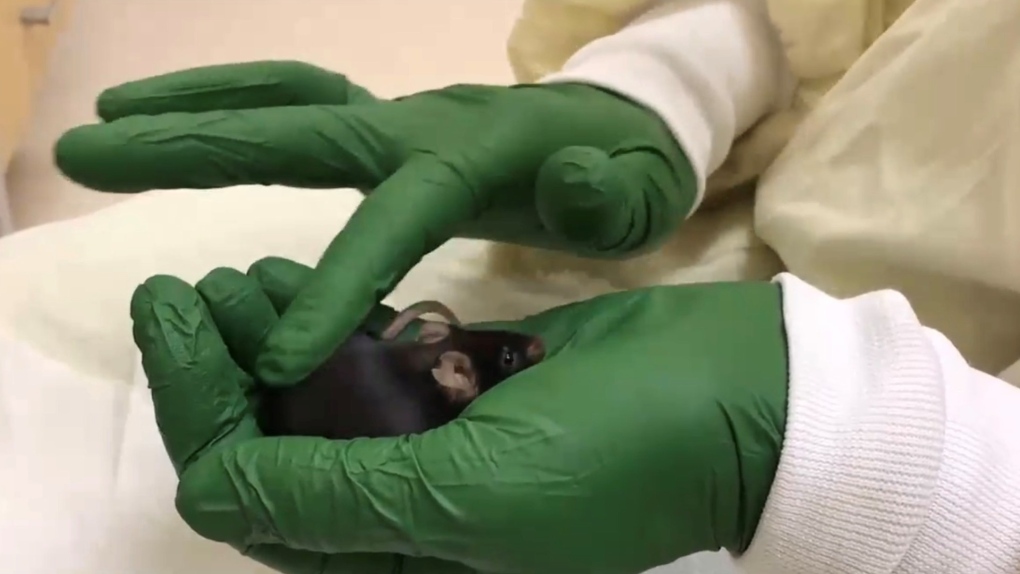U of L researchers exploring if touch could slow dementia’s onset
 The study involved mice specifically bred to develop Alzheimer's.
The study involved mice specifically bred to develop Alzheimer's.
A new study looking at the impact tactile stimulation, such as massaging and touching, is having on mice has researchers at the University of Lethbridge hoping one day it'll help those living with Alzheimer's disease.
"If you imagine that you fall and scrape your hand and what do you do? You rub your hand. And why do you do that? Because it feels better. And why does it feel better? Well, obviously, something is going on in your head that is affecting your brain," said Dr. Bryan Kolb, a neuroscientist at the U of L.
"So, the idea is maybe we can use tactile stimulation as a way of modifying brain activity."
The study involved mice specifically bred to develop Alzheimer's.
The mice either received tactile stimulation daily from birth until weaning (21 days) or, in a separate study, they received TS for 15 days beginning at four months of age.
Control mice received no tactile stimulation.
"By doing that three times a day, we were able to influence the onset of dementia – that is we slowed it down – in fact, we seemed to have blocked it altogether in these animals," Kolb explained.
At five and a half months of age, the experimenters used a series of tests to assess whether tactile stimulation had led to improvements in cognition, motor skills and anxiety behaviours and, at six months of age, the degree of plaque formation and hippocampal volume.
Plaque formation in these mice normally begins around three months of age and by six months, the plaque formation in the brain is saturated and is associated with large deficits in cognition, anxiety and motor skills.
The study is also looking to increase knowledge about what happens in the brain with Alzheimer’s and find more therapeutic treatments.
Around 60,000 Albertans live with dementia and the Alzheimer Society is thrilled to see the new study unfolding.
"Touch is one of the first senses we gain in the womb and it's one of the last senses we lose at the end of life," said Colleen Beck, navigator, client services with the Alzheimer Society.
"So, to hear the university is taking on sensory stimulation is so important."
Beck says ongoing research at the U of L and across the country is vital, as the disease can impact so many.
"It's not about when you lose your keys for the car because we all do that – we all misplace them,” Beck said. “A time to be concerned is when we get in the car and we don't understand the car. It's foreign to us – we don't know how to start it.”
Although a cure for Alzheimer's has yet to be found, those working on the study hope to one day introduce it to humans.
CTVNews.ca Top Stories

DEVELOPING Man sets self on fire outside New York court where Trump trial underway
A man set himself on fire on Friday outside the New York courthouse where Donald Trump's historic hush-money trial was taking place as jury selection wrapped up, but officials said he did not appear to have been targeting Trump.
BREAKING Sask. father found guilty of withholding daughter to prevent her from getting COVID-19 vaccine
Michael Gordon Jackson, a Saskatchewan man accused of abducting his daughter to prevent her from getting a COVID-19 vaccine, has been found guilty for contravention of a custody order.
She set out to find a husband in a year. Then she matched with a guy on a dating app on the other side of the world
Scottish comedian Samantha Hannah was working on a comedy show about finding a husband when Toby Hunter came into her life. What happened next surprised them both.
Mandisa, Grammy award-winning 'American Idol' alum, dead at 47
Soulful gospel artist Mandisa, a Grammy-winning singer who got her start as a contestant on 'American Idol' in 2006, has died, according to a statement on her verified social media. She was 47.
'It could be catastrophic': Woman says natural supplement contained hidden painkiller drug
A Manitoba woman thought she found a miracle natural supplement, but said a hidden ingredient wreaked havoc on her health.
Young people 'tortured' if stolen vehicle operations fail, Montreal police tell MPs
One day after a Montreal police officer fired gunshots at a suspect in a stolen vehicle, senior officers were telling parliamentarians that organized crime groups are recruiting people as young as 15 in the city to steal cars so that they can be shipped overseas.
The Body Shop Canada explores sale as demand outpaces inventory: court filing
The Body Shop Canada is exploring a sale as it struggles to get its hands on enough inventory to keep up with "robust" sales after announcing it would file for creditor protection and close 33 stores.
Vicious attack on a dog ends with charges for northern Ont. suspect
Police in Sault Ste. Marie charged a 22-year-old man with animal cruelty following an attack on a dog Thursday morning.
On federal budget, Macklem says 'fiscal track has not changed significantly'
Bank of Canada governor Tiff Macklem says Canada's fiscal position has 'not changed significantly' following the release of the federal government's budget.
































